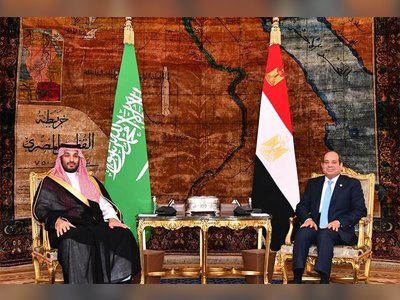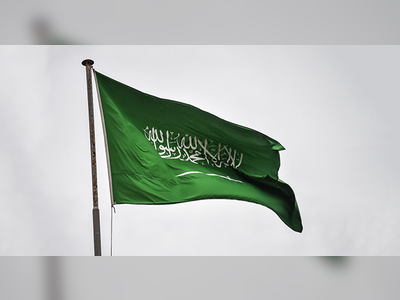
Value of Lebanese pound drops to all-time low
The black market value of the Lebanese pound has fallen to an all-time low of 35,600 against the US dollar, a drop from 26,800 in the space of just two weeks, and a sign that Lebanon’s economic crisis is set to continue to cripple the country.
The exchange rate is unofficial, but is the one primarily used across Lebanon.
The depreciation of the Lebanese pound has caused a ripple effect, causing even more economic difficulties for the country.
Petrol prices in three weeks surged by almost 25 percent, while the government is expected to soon further roll back medicine subsidies and increase their prices.
Meanwhile, Lebanese authorities continue to implement temporary measures to alleviate wheat shortages.
This rapid unravelling, just 10 days after cash-strapped Lebanon elected a new parliament, comes after a few months of relative calm for the fragile currency, which has lost 90 percent of its value in less than three years.
The authorities primarily blame global inflation, and the effect of Russia’s war in Ukraine on international wheat and fuel prices. However, experts say domestic reasons play a large role in creating the economic conditions that currently exist in Lebanon.
“When global prices change, Lebanon is not hit once, but twice,” financial adviser Michel Kozah told Al Jazeera. “It’s because we cannot protect the value of the Lebanese pound.”
More makeshift measures, fewer resources
Lebanon hobbled into 2022 in similar circumstances, as the Lebanese pound’s value started to depreciate after the Christmas season.
However, the central bank was able to offset this at the time by spending dollars from its foreign reserves to fund its exchange rate platform Sayrafa.
This enabled the central bank to offer a more preferable exchange rate than the black market, and encourage banks and businesses to buy their dollars from Sayrafa.
The effect of this was a reduction in the number of Lebanese pounds flooding the market – thus improving its value – while also weakening the unofficial parallel rate on the black market.
“The central bank would take Lebanese pounds away from the market and throw dollars in to keep the rate stable,” Kozah told Al Jazeera.
The policy was initially a success. By mid-January, the Lebanese pound’s value against the dollar in 24 hours went from above 31,000 to just under 28,000
But Lebanon’s resources are limited, and this latest example of financial wizardry was not sustainable.
The central bank’s foreign reserves are estimated at just $11bn, which includes just over $1bn in International Monetary Fund Special Drawing Rights – an international asset that can be converted into hard currency.
The IMF introduced SDRs to provide a cash injection to help countries cope with the economic effect of COVID-19.
Lebanon’s reliance on importing almost all its goods, and its banks losing an estimated $69bn since August 2019, mean the country is suffering.
And with the currency spiralling out of control, Lebanon’s distressed population, three-quarters of which lives in poverty, fears a repeat of last summer, when importers hoarding fuel and medicine forced much of the population to buy petrol, diesel for electricity, and life-saving medicines from the black market.
“What’s frightening is that like last summer we’re seeing importers hoarding goods and waiting for prices to rise so they can sell at a higher profit,” political and economic researcher Karim Merhej told Al Jazeera, adding that Lebanon’s government does not have the resources to crack down on hoarding, smuggling and illicit price hikes. “It’s a Wild West, free-for-all type situation.”
‘The only way forward’
With dwindling resources, a cabinet now operating in a limited caretaker capacity, and a divided new parliament that has not yet met, Lebanon is in for a difficult summer. Inflation is already set to worsen, as mobile phone bills in July will be five times more expensive and internet bills almost triple.
Newly elected politician Mark Daou, who along with about a dozen other anti-establishment candidates made a surprise breakthrough in the elections, says it will be up to them to make sure there is no political paralysis in Lebanon, and that the country’s politicians enact reforms.
“Financial reforms like capital controls, banking secrecy, judicial independence and a few others are fundamental for regaining trust and stabilising the markets,” Daou told Al Jazeera. “I think the new MPs will bring some positive dynamics in parliament, forcing blocs to meet and conduct policies that are suitable.”
The country’s new parliament has a long list of tasks with little time to waste when it does meet.
Lawmakers need to swiftly appoint a new prime minister-designate, and hold consultations to form a new and viable government.
Then, in order to receive an IMF bailout, the Lebanese parliament needs to enact a handful of financial and accountability reforms that the country’s traditional political parties, commercial banks and central bank have stalled for years. This includes passing a state budget, making Lebanon’s judiciary independent from the government, and auditing the central bank.
“I think we need a cabinet of experts, especially [those with a background] in restructuring corporations and countries, and I think they need exceptional legislative powers so not every decision gets stalled in parliament,” Kozah said. “And we need to implement the reforms for the IMF. This is the only way.”
Lebanon’s influential commercial bank lobby earlier this week slammed the government for its latest iteration of the IMF’s financial recovery plan, hinting at further deadlock.
“I think this parade of temporary measures will unfortunately continue,” Kozah admitted.
Lebanon desperately needs a cash injection to make its paralysed economy viable again. And at a time when people need them the most, there are no viable public healthcare, education and social protections.
Regardless of whether Lebanon is able to get out of the crisis, Merhej said that all this could have been avoidable, and that the government allowed the economy to get to the place it is today.
“It never had to be this bad,” Merhej said. “The authorities could have tackled the crisis as it was brewing back in August 2019 by implementing the necessary policies in a transparent manner – but they chose not to.”











